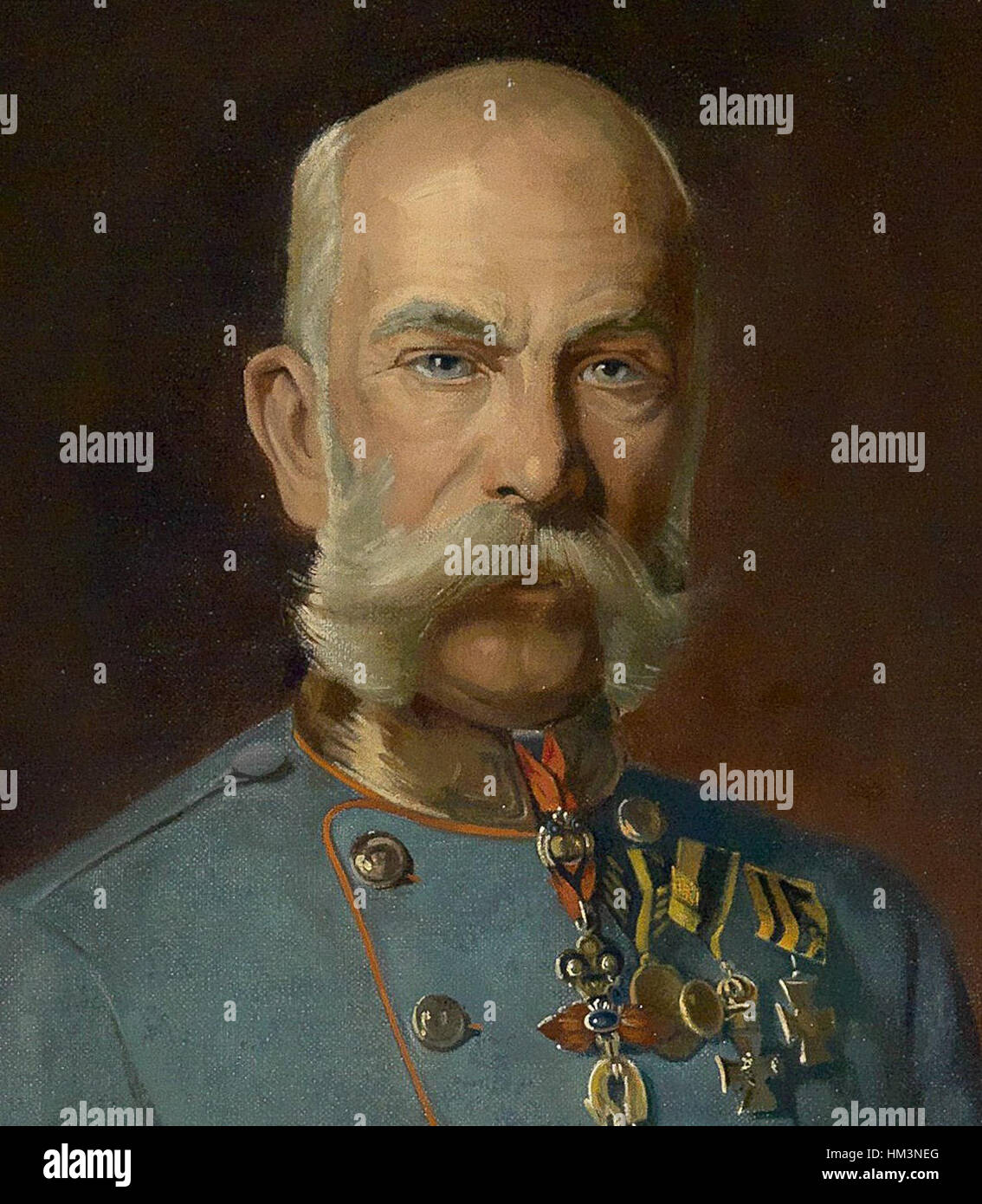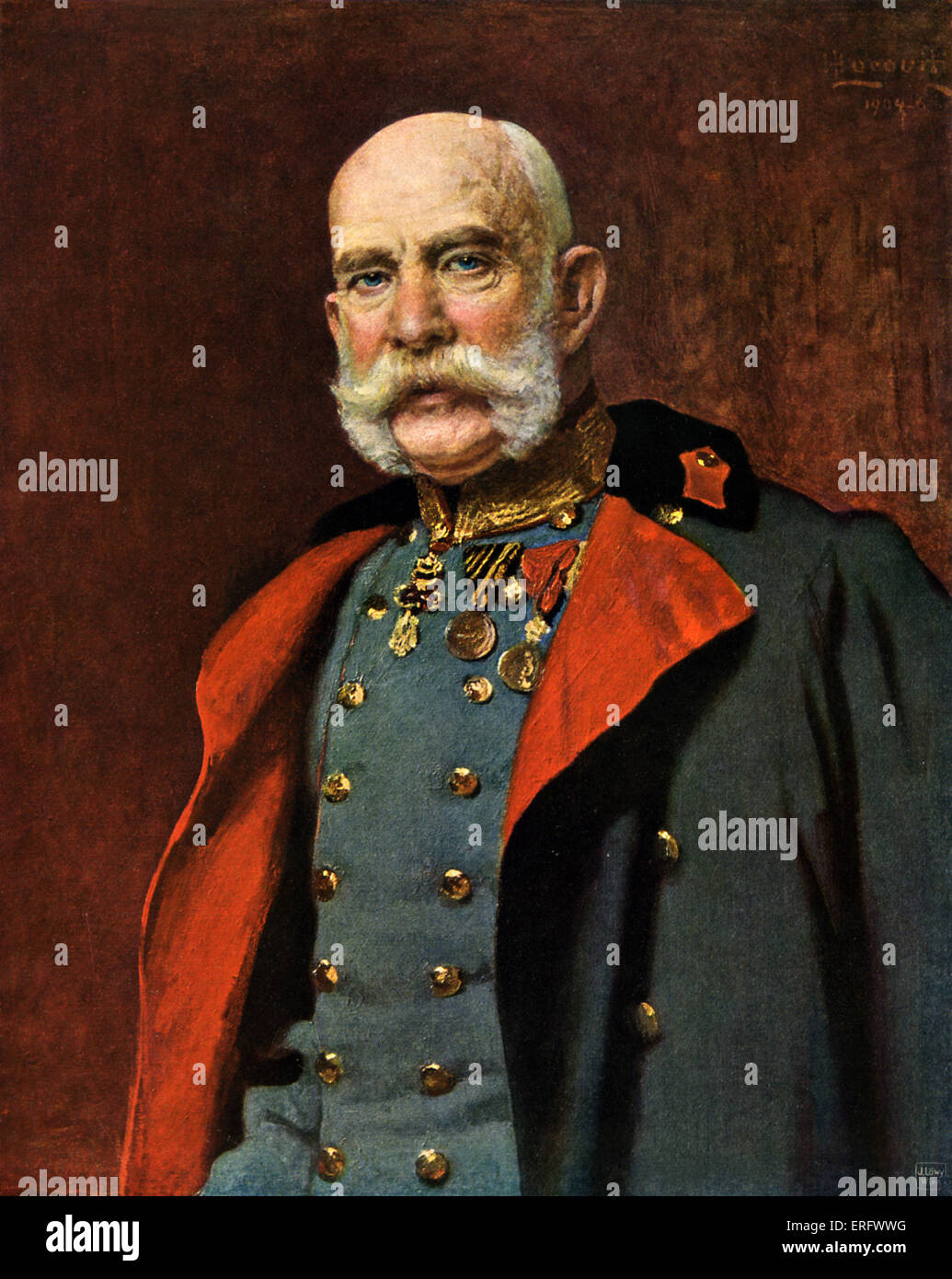Exploring The Legacy Of Kaiser Franz Joseph: Austria's Long-Reigning Emperor
When we think about powerful figures from history, certain names just stand out, don't they? One person who definitely fits that description is Kaiser Franz Joseph. His story is pretty remarkable, spanning decades of big changes and moments that shaped a whole part of the world. He was, in a way, a central figure for many people for a very long time, and his influence, you know, still gets talked about even today.
This emperor, who also held the title of king in Hungary, really does loom large in the historical consciousness of posterity, as some folks put it. He took on his royal duties at a young age and, honestly, stayed in that position for an incredibly long stretch. His personal approach to being a ruler was deeply shaped by a very strong sense of duty and a clear mission, which, you know, pretty much guided everything he did.
So, what was it really like during his time? How did he manage such a huge empire for so long? We're going to take a closer look at his life, his reign, and the lasting mark he made on history. We'll also get into some of the more personal aspects of his journey, including his family connections and how people saw him.
- Wait A Minute Could Gina And Mack
- Dekenta Parchman Michigan Man 30 Who Tortured
- Casey Burke Bio Age Wiki Facts And
- Who Is Ciara Bravo Dating Now Past
- Xochitl Gomez Siblings Does She Have Any
Table of Contents
- Biography of Kaiser Franz Joseph
- Personal Details and Bio Data
- Legacy and Impact
- Addressing Common Questions
Biography of Kaiser Franz Joseph
Early Life and Accession to the Throne
Franz Joseph I, popularly known as Franz Joseph I, was born in 1830. He came into the world at a time when Europe was, you know, a place of big shifts and movements. His early years were spent within the grand and quite formal world of the Habsburg family. This family had, for many centuries, held a lot of power across Central Europe, and their traditions were, honestly, pretty ingrained. He was, in a way, being prepared for a significant role from a very young age, even if the exact timing of his ascension wasn't clear at first.
Then, in 1848, a year that saw a lot of unrest and change across the continent, Franz Joseph ascended the throne of the Austrian Empire. This was a really challenging time, as a matter of fact, with revolutions and demands for new ways of doing things bubbling up everywhere. Taking on the leadership of such a large and diverse group of lands and peoples during such a turbulent period must have been, you know, a truly immense task for a young man. He was, essentially, thrust into a position of immense responsibility when he was still quite young, and he had to learn very, very quickly how to manage things.
His early reign was, therefore, marked by efforts to stabilize the empire and restore order after the widespread disturbances. He had to deal with various groups within his lands, each with their own wishes and complaints. It was, arguably, a period that shaped his entire approach to governing, making him, you know, very aware of the need for stability and a strong central authority. He quickly understood that maintaining the empire meant being firm but also, in some respects, adaptable to the changing times, which was a tough balance to strike.
- Paula Harwood Bio Net Worth Height Career
- Is Tyler Langford Based On A Real
- What Happened To Tina Turner S Sister
- Tiffany Lau Bio Age Wiki Facts And
- Get To Know Tiania Haneline Her Boyfriend
Marriage and Family Life
Beyond his political duties, Franz Joseph's personal life also played a big part in his story. He was married to his first cousin, Elisabeth of Bavaria, a woman who, you know, became famously known as Sisi. They married in 1854, which was just six years after he had taken on the crown. Their union was, in a way, a significant event for the empire, bringing together two prominent European families.
Elisabeth herself was a fascinating figure, quite independent and, honestly, not always comfortable with the strict rules of court life. This meant their marriage, while outwardly grand, had its own complexities. She preferred to travel and seek personal freedom, which, you know, sometimes put her at odds with the emperor's more rigid routine and sense of duty. Their relationship, therefore, was a blend of deep affection and, pretty much, a certain amount of distance, shaped by their very different personalities and the immense pressures of their positions.
Together, they had several children, and the family faced their share of joys and sorrows. The tragedies that touched their family, like the death of their only son, Crown Prince Rudolf, and Elisabeth's own assassination much later, really had a profound impact on Franz Joseph. These personal losses, you know, added another layer to the burdens he carried as a ruler, making his long reign even more poignant for him, personally. He was, in a way, a man who experienced great personal pain while also steering a vast empire.
His Concept of Rulership
Franz Joseph's concept of rulership was informed by a great sense of duty and mission. He saw himself, essentially, as the father figure of his vast empire, responsible for the well-being of all his subjects. This wasn't just a job for him; it was, you know, a calling, a sacred trust handed down through generations. He believed very strongly in the importance of tradition and stability, especially after the upheavals he witnessed early in his reign.
For most of his subjects, the emperor was a sacrosanct figure who, honestly, represented the continuity and strength of the empire. People often saw him as a symbol of their shared identity, someone who was above the day-to-day squabbles of politics. He worked incredibly hard, dedicating long hours to state affairs, reading reports, and meeting with officials. This dedication, you know, was widely recognized and, pretty much, earned him a lot of respect, even from those who might have disagreed with his policies.
He had a very particular way of doing things, valuing order and a systematic approach. His daily routine was, basically, famously disciplined, reflecting his deep commitment to his role. This steadfastness, you know, was a defining characteristic of his time on the throne. He truly believed that his personal diligence was essential for the empire's survival and, in a way, for the happiness of its many peoples, which was a big responsibility to carry every single day.
Key Events of a Long Reign
Franz Joseph's reign was, honestly, one of the longest in European history, stretching for 68 years. During this time, the world changed a lot, and his empire had to change with it, or at least try to. One of the most significant events was the Austro-Hungarian Compromise of 1867. This agreement, you know, transformed the Austrian Empire into the dual monarchy of Austria-Hungary, giving Hungary a lot more autonomy within the overall structure. It was, in a way, a big political adjustment designed to keep the empire together amidst rising nationalist feelings.
He also oversaw periods of industrial growth and, pretty much, social change. Cities like Vienna, the capital, grew and modernized, becoming vibrant centers of culture and science. There were, you know, new technologies emerging, and society itself was shifting, with different classes and groups gaining more influence. The emperor, in a way, had to navigate these currents, trying to balance tradition with the need for progress, which was not always an easy thing to do.
However, his later years were, tragically, marked by increasing international tensions and conflicts. The complex web of alliances and rivalries in Europe eventually led to the outbreak of World War I in 1914. This was, honestly, a devastating global conflict that would eventually lead to the collapse of his empire shortly after his death. He passed away in 1916, still on the throne, meaning he didn't live to see the final dissolution of the empire he had ruled for so long. His reign, therefore, spans a period of immense transformation, from a more traditional monarchy to the cusp of a modern, turbulent world.
Personal Details and Bio Data
Here's a quick look at some key facts about Kaiser Franz Joseph:
| Full Name | Franz Joseph I of Austria |
| Popular Name | Franz Joseph I |
| Born | August 18, 1830 |
| Ascended Throne | December 2, 1848 |
| Titles Held | Emperor of Austria, King of Hungary, King of Bohemia, etc. |
| Spouse | Elisabeth of Bavaria (married 1854) |
| Died | November 21, 1916 |
| Reign Length | 68 years |
| Notable Feature | Trademark moustache and sideburns (Photo courtesy of the Library of Congress) |
Legacy and Impact
Enduring Influence
Franz Joseph looms large in the historical consciousness of posterity, and that's not just a fancy way of saying he's remembered. His incredibly long reign meant he was a constant presence for generations of people across Central Europe. For many, he was the only ruler they had ever known, and his image was, you know, deeply ingrained in their lives. This long period of stability, even with its challenges, is often associated with him, and that's a big part of his lasting impact.
Even today, his name often comes up when people talk about the final years of the old European empires. He represents, in a way, an era that was slowly fading, a time when monarchs held immense power and tradition was, pretty much, paramount. His story, therefore, isn't just about one man; it's about the very end of a certain kind of world, which is, honestly, quite compelling. You can still find statues of Francis Joseph I in Austria, for example, showing how he is still honored and remembered there, which is pretty cool.
His dedication to duty and his personal integrity are also qualities that, you know, historians and ordinary people often point to. Despite the immense pressures and personal sorrows he faced, he remained committed to his role until the very end. This steadfastness, in a way, has left a significant mark on how people view leadership and public service, even now, which is pretty interesting to think about, really.
His Public Image
The image of Emperor Franz Joseph, sporting his trademark moustache and sideburns, is instantly recognizable to anyone who has seen pictures of him. This particular look became, you know, a very strong part of his public persona, almost as iconic as his long reign itself. It conveyed a sense of dignity, tradition, and a certain old-world charm that many of his subjects, basically, appreciated. This visual consistency helped to solidify his image as a stable and reliable leader.
Beyond his physical appearance, his public image was also built on his reputation for hard work and his strong sense of responsibility. He was often portrayed as a diligent ruler, someone who put the empire's needs above his own. This perception, you know, helped to foster a sense of loyalty among his people. They saw him as a steady hand guiding the ship of state through sometimes turbulent waters, which, honestly, gave many a sense of security.
His image, in a way, became synonymous with the empire itself for many years. When people thought of Austria-Hungary, they often pictured Franz Joseph. This connection was, pretty much, incredibly powerful, making him a symbol of continuity and identity for a diverse population. Even after his passing, that image has continued to resonate, making him one of the most memorable figures from that period of history, and that's really saying something.
Addressing Common Questions
People often have questions about Kaiser Franz Joseph, which is totally understandable given his long and significant life. Here are a few common ones:
What was Kaiser Franz Joseph known for?
Kaiser Franz Joseph was known for several big things, honestly. First off, his incredibly long reign, which lasted 68 years, is a huge part of his story. He was also known for his deep sense of duty and mission, which guided his rule. He oversaw the transformation of the Austrian Empire into the dual monarchy of Austria-Hungary in 1867, which was a very big deal. And, of course, his distinctive look, with his famous moustache and sideburns, is also something many people remember him for, you know, even today.
When did Franz Joseph become emperor?
Franz Joseph ascended the throne of the Austrian Empire in 1848. This was a really turbulent year across Europe, with revolutions and significant political unrest happening in many places. He was quite young when he took on this immense responsibility, stepping into a role that had been held by his family for centuries, and that's a pretty interesting fact to consider.
Who was Franz Joseph married to?
Franz Joseph was married to his first cousin, Elisabeth of Bavaria. She was a fascinating woman, known for her beauty and her independent spirit. Their marriage took place in 1854, just a few years after he became emperor. Their relationship, you know, was complex and, in a way, quite public, with both joys and sorrows that impacted their lives and, pretty much, the empire itself.
If you're interested in more historical figures or the fascinating stories of European monarchies, you can learn more about historical leaders on our site. And to explore other significant periods, you can link to this page European history timelines for more information. There's so much to discover about how the past shapes our present, honestly, and it's always worth a look.
- Alyssa Grenier Obituary South Windsor Ct Alyssa
- Sharon Case Net Worth Husband Married Children
- Fame Mark Belling Net Worth And Salary
- Adria Wu Where Is Five Star Chef
- Xochitl Gomez Siblings Does She Have Any

Haus von Kaiser Franz Joseph - Linz

Kaiser Franz Joseph Stock Photo - Alamy

Franz Joseph